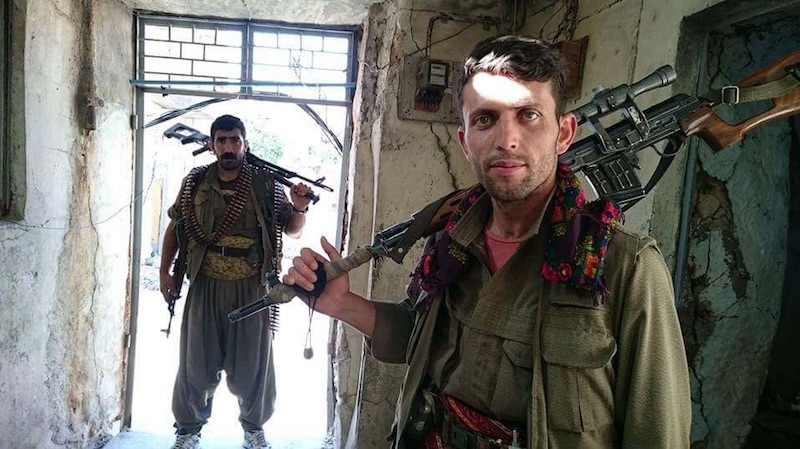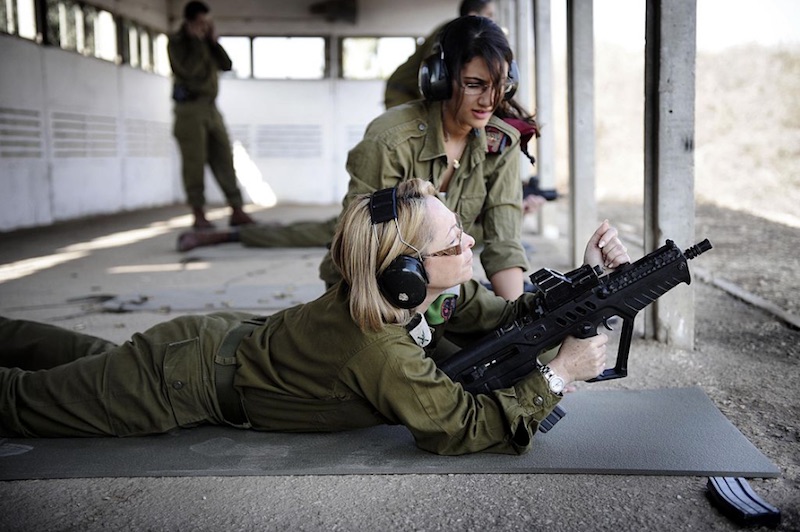Hol Dir den wöchentlichen SPARTANAT-Newsletter.
Dein Bonus: das gratis E-Book von SPARTANAT.

INTERVIEW: Martin van Creveld – „Die Guerillas sind besser“
Im Interview mit dem österreichischen Magazin „Frank&Frei“ – wir übernehmen das Interview mit freundlicher Genehmigung – spricht der israelische Militärhistoriker Martin van Creveld über die gegenwärtige Schwäche des Westens und die Ursache für das häufige Scheitern westlicher Armeen. Üm dieses Thema kreist auch sein Buch „Wir Weicheier: Warum wir uns nicht mehr wehren können und was dagegen […]
Im Interview mit dem österreichischen Magazin „Frank&Frei“ – wir übernehmen das Interview mit freundlicher Genehmigung – spricht der israelische Militärhistoriker Martin van Creveld über die gegenwärtige Schwäche des Westens und die Ursache für das häufige Scheitern westlicher Armeen. Üm dieses Thema kreist auch sein Buch „Wir Weicheier: Warum wir uns nicht mehr wehren können und was dagegen zu tun ist“. Wichtige Gründe für den Niedergang sieht Van Creveld in der fehlenden Motivation der Soldaten, im Feminismus, der Präsenz von Soldatinnen in den Armeen und in der vorherrschenden Erziehung.
SPARTANAT: In den Rankings der zehn besten Armeen der Welt scheinen fast immer die USA, Großbritannien, Frankreich, manchmal auch Deutschland auf. In Ihrem Buch „Wir Weicheier“ beklagen Sie, dass genau diese Armeen in den vergangenen Jahrzehnten sämtliche Kriege verloren haben. Haben solche Ratings also keinerlei Relevanz?
Martin van Creveld: So ist es. Diese Armeen sind vermutlich die besten bei konventionellen Kriegen wie dem Falklandkrieg oder dem Ersten Irakkrieg. Doch die meisten Kriege sind nicht mehr konventionell und diese Kriege haben diese Armeen verloren. Gerade die Einsätze der deutschen Bundeswehr waren furchtbar. Warum soll sich ein deutscher Soldat töten lassen, damit Schiiten, Sunniten, Christen oder Israelis einander nicht mehr bekämpfen?
SPARTANAT: Dann lag der Fehler in den Zielsetzungen dieser Kriegseinsätze?
Creveld: Viele dieser Interventionen sind für die einfachen Soldaten überhaupt nicht verständlich. Was haben die dort zu suchen? Das erzeugt Probleme für die Motivation der Soldaten. Motivation war im Krieg immer einer der wichtigsten, wenn nicht der wichtigste Faktor. Ohne Motivation scheitert man im Angesicht des Todes.
SPARTANAT: Wird das technische Equipment überschätzt?
Creveld: In diesen Kriegen hat fast immer die technisch unterlegene Seite gewonnen, auch wenn sie einen sehr hohen Preis dafür bezahlt hat.
SPARTANAT: Sie denken an Indien, Vietnam, Afghanistan …
„Guerillas und Terroristen sind ganz einfach besser. Sie waren motivierter, enthaltsamer, entschlossener, erfindungsreicher.“
Creveld: Das sind nur die bekanntesten Fälle, aber es gab dutzende davon. Viele Bücher haben sich damit befasst. Manche machen die verfehlte Organisation oder die falschen Zielsetzungen für die Niederlagen verantwortlich, andere meinen, die Politiker seien zu weich, die Offiziere zu schlecht oder die öffentliche Meinung zu kritisch gewesen. Das ist alles richtig. Doch letztlich waren die Guerillas und Terroristen ganz einfach besser. Sie waren motivierter, enthaltsamer, entschlossener, erfindungsreicher. Daran kommt man einfach nicht vorbei.
SPARTANAT: Sind solche asymmetrischen Kriege, in denen eine technisch überlegene Zivilisation gegen eine unterlegene kämpft, eine spezifische Herausforderung?
Creveld: Natürlich. Das schafft eine ganz andere Situation. Manche Politiker haben noch immer nicht begriffen, wie selbstzerstörerisch solche Kriege sein können.
SPARTANAT: Die Trennung zwischen Zivilisten und Soldaten fällt oft weg.
Creveld: Genau. Ich habe vor 30 Jahren den Terminus des „dreifältigen Kriegs“ erfunden. Für den zwischenstaatlichen Krieg war ein klarer Unterschied zwischen Regierung, Streitkräften und Zivilisten charakteristisch, wie Carl von Clausewitz (1780 – 1831) herausgestellt hat. Ab der zweiten Hälfte des 17. Jahrhunderts hat man so in Europa und später woanders Krieg geführt. Wenn man sich nicht daran gehalten hat, galt das als Kriegsverbrechen. Nach dem Zweiten Weltkrieg ist diese Arbeitsteilung zusammengebrochen.
SPARTANAT: Ist es für die Soldaten psychisch belastend, nicht zu wissen, ob sie auf Soldaten oder Kinder schießen?
Creveld: Für die Soldaten ist das eine sehr große Belastung, gerade weil der Gegner so schwach ist. Es wäre schön, wenn wir wieder konventionelle Kriege hätten, wie es der Falklandkrieg war, doch in vielerlei Hinsicht ähnelt unsere Situation dem Dreißigjährigen Krieg. In Syrien gibt es eigentlich kein Heer, sondern nur verschiedene Milizen. Manche werden von ausländischen Mächten kontrolliert. Die Türkei, der Iran, Russland, die USA – alle mischen sich ein. Keiner kennt sich mehr aus. Sicher ist nur eins: Die Zivilisten leiden fürchterlich.
SPARTANAT: Auch im Gazastreifen oder im Libanon fällt die Unterscheidung zwischen Soldaten und Zivilisten weg. Wie geht Israel damit um?
„Ein Problem ist: Die Armee verliert, solange sie nicht siegt. Der Guerilla siegt, solange er nicht verliert. Deshalb gibt es Krieg ohne Ende, Messerattacken, Selbstmordanschläge und Raketen.“
Creveld: Man kann dieses Problem nicht gut lösen, aber Israel hat es gut genug gelöst, um zu überleben – bisher. Die Auswirkungen auf die israelische Gesellschaft sind sehr hart. Ein Problem ist: Die Armee verliert, solange sie nicht siegt. Der Guerilla siegt, solange er nicht verliert. Deshalb gibt es Krieg ohne Ende, Messerattacken, Selbstmordanschläge und Raketen.
SPARTANAT: Eine wichtige Ursache für die Schwächung der westlichen Zivilisationen sehen Sie im Feminismus und im Gendering. Meinen Sie, die Lage wäre besser, wenn nur Männer das Sagen hätten?
Creveld: Die Männer haben fast kampflos aufgegeben. Die Frauen brauchen uns Männer für zwei Zwecke: Kinderzeugung und Schutz. Beides fällt heute weg. Wir sind schwach geworden. Das ist vielleicht das Geheimnis des Feminismus. Nicht umsonst ist Putin gegen den Feminismus. Die russischen Soldaten sind bereit, Dinge zu tun, die andere nicht mehr tun wollen oder können. Im Krieg braucht man nicht nur gute Technologie, sondern Leute, die bereit und fähig sind, Kehlen durchzuschneiden. Vielleicht haben die Russen heute die beste Armee.
SPARTANAT: Es gab früher bedeutende Herrscherinnen. Was ist das Hauptproblem an der heutigen Rolle der Frau?
Creveld: Es wird eine Gesellschaft geboren, in der für Männer ganz einfach kein Platz mehr ist. Man kann kaum eine Bewegung mehr machen oder ein Wort sagen, ohne für sexuelle Belästigung beschuldigt zu werden. Zurzeit macht sich die ganze Welt über Europa, die USA und Kanada lustig. Das sind keine Männer mehr, sagen sie. Sie können mit ihren eigenen Frauen nicht umgehen. Wie sollen die kämpfen? Der Feminismus ist der größte und am besten organisierte Penisneid der Welt. Frauen glauben immer: Das, was die Männer tun, ist wichtiger und besser als das, was sie tun. Doch sie fangen immer 100 Jahre zu spät damit an. Wenn morgen die Männer von den Dächern springen, werden ihnen die Frauen folgen.
SPARTANAT: Sie kritisieren die Aufnahme von Frauen als Soldatinnen beim Heer.
Creveld: Der US-amerikanische Marineminister Josephus Daniels (1862 – 1948) hat einmal gesagt, dass man eine Frau nicht wie einen Mann behandeln kann. Es geht nicht. Wenn man Frauen dabei hat, fangen die disziplinären Probleme an. Man muss eine Grenze ziehen und die liegt bei den kämpfenden Truppen. Ansonsten bleibt man auf lange Sicht ohne Männer, denn die werden sagen: Wenn es Frauen tun können, ist es für mich keine Ehre mehr, es auch zu tun. Den Sport nimmt man heute viel ernster als den Krieg. Dort lässt keiner Männer gegen Frauen kämpfen. Die Tribünen wären leer. Auch bei den Gladiatorenspielen der Römer sind einander möglichst ebenbürtige Gegner gegenübergestanden. Beim Heer ist das anders, weil wir den Krieg nicht mehr ernst nehmen.
SPARTANAT: Sollten Migranten aus patriarchalischen Gesellschaften für unsere Armeen abgeworben werden?
Creveld: So haben das die alten Römer gemacht. Ab der Zeit von Augustus haben sie immer mehr Germanen in ihren Armeen zugelassen. Zuletzt gab es keine römische Armee mehr. Bis hin zum Befehlshaber bestand sie nur mehr aus Germanen und Barbaren, und die haben nicht mehr das Römische Reich verteidigt. Was noch schlimmer war: Es gab eine Trennung zwischen Regierenden und Soldaten. Jene, die kämpfen konnten, konnten nicht regieren, und jene, die regierten, konnten nicht kämpfen. Diese Trennung ist auf lange Sicht sehr gefährlich.
SPARTANAT: Sie kritisieren in Ihrem Buch die heutige Erziehung in Familie und Schule: Sie führe zur Unselbständigkeit. Ist Selbstständigkeit für einen Soldaten wichtig?
Creveld: Krieg ist von Unsicherheit gekennzeichnet, mehr als jede andere menschliche Tätigkeit. Deshalb läuft immer alles falsch. Ohne Eigenständigkeit geht es nicht. Krieg erfordert das selbständige Zusammenwirken aller Soldaten, vom einfachen Soldat bis zum General. Darüber hinaus ist der Kampf je nach Krieg und Feind sehr unterschiedlich. Die Fähigkeit und der Wille zu Initiative und zu eigenständiger Arbeit sind daher unerlässlich. Das Hauptproblem ist: Wie kombiniert man Selbstständigkeit mit Disziplin?
SPARTANAT: Welche Armeen haben dieses Problem am besten gelöst?
Creveld: Die deutschen Armeen zwischen 1870 und 1945. Idealerweise sollen Disziplin und Initiative einander wechselseitig verstärken. Das ist das Ideal. Wie man das schafft, ist eine schwierige Frage, und das hängt auch von der Kultur ab. Manches kann man von einem deutschen Soldaten verlangen, aber nicht von einem amerikanischen und umgekehrt.
SPARTANAT: Und Israels Armee?
Creveld: Israel ist das undisziplinierteste Land der Welt, das ich kenne. Früher war es ein Vorteil im Hinblick auf Initiative. Heute bin ich mir nicht mehr sicher. Das Hauptproblem ist: Wir haben jahrelang gegen Leute gekämpft, die so schwach sind, dass sie eigentlich keine echten Gegner sind. Wenn man einen schwachen Gegner bekämpft, wird man selber schwach. So ist das auch beim Spiel.
„Viele Regeln des Spiels gelten für den Krieg und umgekehrt.“
SPARTANAT: Sie haben ein Buch über Kriegsspiele geschrieben, demzufolge viel Ähnlichkeit zwischen Krieg und Spiel besteht.
Creveld: Viele Regeln des Spiels gelten für den Krieg und umgekehrt. In vielerlei Hinsicht ist der Krieg keine Fortsetzung der Politik, sondern eine gewaltsame Form des Spiels.
SPARTANAT: Sie haben eine hohe Meinung von der jetzigen russischen Armee. Wie sehen Sie jene Chinas?
Creveld: Schwer zu sagen. Die Chinesen haben seit vielen Jahren keinen Krieg mehr geführt. Sie sind nie ein militärisches Volk gewesen. Der Mandarin (Zivilbeamter der chinesischen Staatsverwaltung) stand immer über dem Militär. Es ist eine konfuzianische Gesellschaft und Konfuzius war alles, nur kein Militarist. Ich habe bei einem zweiwöchigen Besuch viele junge Offiziere getroffen. Die Befehle gehen von oben nach unten, aber kein Vorschlag geht von unten nach oben. Wenn sich China einmal im Kampf befinden sollte, wird die fehlende Eigenständigkeit der Soldaten, meiner Einschätzung nach, ein Problem sein. Sie sind nicht daran gewöhnt, selbständig zu denken. Wenn sie es müssen, fühlen sie sich unsicher.
 MARTIN VAN CREVELD, einer der führenden Militärhistoriker der Gegenwart, wurde 1946 in Holland geboren. Seit 1950 lebt er in Israel. Er studierte an der London School of Economics und an der Hebrew University in Jerusalem, wo er seit 1971 als Professor für Geschichte lehrt. Bücher u.a.: „Kampfkraft“, „Gesichter des Krieges“, „The Sword and the Olive“, „Aufgang und Untergang des Staates“,… Darüber hinaus ist er als militärischer Berater und Referent in der gesamten westlichen Welt tätig.
MARTIN VAN CREVELD, einer der führenden Militärhistoriker der Gegenwart, wurde 1946 in Holland geboren. Seit 1950 lebt er in Israel. Er studierte an der London School of Economics und an der Hebrew University in Jerusalem, wo er seit 1971 als Professor für Geschichte lehrt. Bücher u.a.: „Kampfkraft“, „Gesichter des Krieges“, „The Sword and the Olive“, „Aufgang und Untergang des Staates“,… Darüber hinaus ist er als militärischer Berater und Referent in der gesamten westlichen Welt tätig.
Martin van Creveld im Internet: www.martin-van-creveld.com
Martin van Creveld auf SPARTANAT:
– Wie Daesch bekämpft werden soll
– Wissenschaftler, Journalisten, Spione
Dieses Interview mit Martin van Creveld ist zuerst im Magazin Frank & Frei erschienen. Wir veröffentlichen es hier mit freundlicher Genehmigung des des Verlages. Herzlichen Dank! Frank & Frei ist HIER erhältlich.
SPARTANAT ist das Online-Magazin für Military News, Tactical Life, Gear & Reviews.
Schickt uns eure News: [email protected]
Werbung
Hol Dir den wöchentlichen SPARTANAT-Newsletter.
Dein Bonus: das gratis E-Book von SPARTANAT.




